© 2014-


Radio Nord - History (3)

The Radio Nord offices in Stockholm obtained early editions of the morning newspapers at 3.00am and edited stories from them for use on radio bulletins. They also monitored the Swedish State Radio news for more up-
The edited stories were then fed to the ship via the ship-
The system of using the ship-
Radio Nord was at first serviced by a fishing boat, Listerlind, which took crew and equipment out to the Magda Maria. However, the Listerlind was soon found to be too small and uncomfortable for the three hour journey and was replaced by a larger tender, the Bellana. All journeys to the ship were cleared through customs and Swedish Government export licences had to be obtained for certain items of specialist technical equipment.
The station a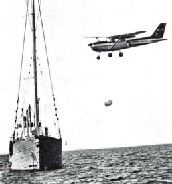 lso used a Cessna light aircraft , similar to that used by the Danish offshore station Radio Mercur, to drop canisters containing programme tapes, commercials, mail, newspapers and messages on an almost daily basis. The canisters, with a line attached to them, were thrown from the aircraft so that they would land in the sea across another line which trailed from the stern of the ship and was secured to floats. The ropes attached to the canister would catch in the floats and it was then hauled on board by the crew using a rope and pulley mechanism. So effective was this delivery system that during the life of the station only two canisters were not retrieved from the sea.
lso used a Cessna light aircraft , similar to that used by the Danish offshore station Radio Mercur, to drop canisters containing programme tapes, commercials, mail, newspapers and messages on an almost daily basis. The canisters, with a line attached to them, were thrown from the aircraft so that they would land in the sea across another line which trailed from the stern of the ship and was secured to floats. The ropes attached to the canister would catch in the floats and it was then hauled on board by the crew using a rope and pulley mechanism. So effective was this delivery system that during the life of the station only two canisters were not retrieved from the sea.
The curtailment of the ship-
Radio Nord's programme format of music and regular news bulletins proved immensely popular with Swedish listeners. In response to this offshore competition Swedish State Radio introduced an easy listening service -
An opinion poll taken in June 1961 by the Institute for Market Inquiries (IMU) showed that, even after the introduction of Melodi Radio, more listeners consistently tuned into Radio Nord for their musical entertainment.
At first Radio Nord only had one advertiser -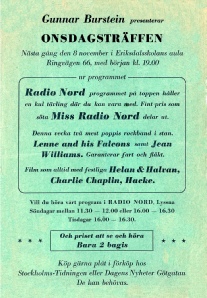 e. Gradually businessmen began to realise the benefits of using the station in their advertising campaigns and some amazing sales results were achieved following promotion on Radio Nord.-
e. Gradually businessmen began to realise the benefits of using the station in their advertising campaigns and some amazing sales results were achieved following promotion on Radio Nord.-
After nine months on the air without any real problems, trouble came for Radio Nord on 6th December 1961, when during a 70mph gale the Magda Maria began dragging her anchor and started to drift from her mooring. Although no one could have imagined it at the time this was to be the first of many such storm dramas which would affect the ship during its offshore radio life.
The storm had actually started on 2nd December 1961 when a steadily increasing wind and rough seas made the Magda Maria roll dramatically at her anchorage. Everybody on board grew increasingly tired and physically exhausted as the storm continued day after day -
By the early morning of 6th December the storm had intensified and with waves towering above the ship, causing her to keel, at times over to 45 degrees, the anchor chain broke and the Magda Maria started to drift. In the studio broadcasting staff fought to keep the taped programmes on the air, but with the constant movement of the ship tapes and cartridges were flung from their racks and strewn across the floor.
Having confirmed that the Magda Maria was actually drifting, the Captain ordered the engines to be started, but pressure in the air tanks had dropped preventing diesel flowing to the engines. The Captain, by now up to his waist in water on the deck, ordered the crew to pump up the pressure using the only means available -
After several hours pumping the pressure a few attempts were made to start the engines, but without success. With the pressure dropping once more further attempts to start the engines were useless so everyone had to return to the hand pump and begin the operation all over again.
Incredibly Radio Nord's programmes were transmitted as normal throughout this drama until 5.00pm when the news service had to be discontinued. This was because the on-
Radio Nord’s plane delivering programme tapes

Click on picture to enlarge
Hauling the programme tapes canister aboard Magda Maria
Photo: Ingemar Lindqvist
Loading the programme tapes canister on the plane.
Photo: Ingemar Lindqvist
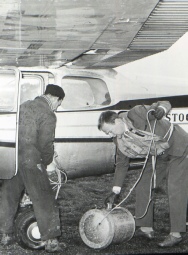
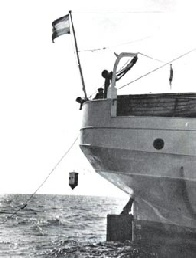
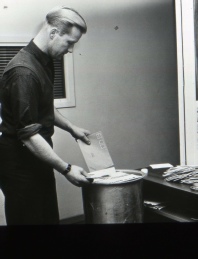
Opening the canister aboard Magda Maria
Photo: Ingemar Lindqvist
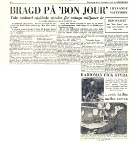
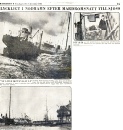
Expressen
7th December 1961
Ingemar Lindqvist

History
Key Dates
Ship and Location
Technical
Staff
Programmes





Click to enlarge
Columbia ‘Make You a Star’ promo

American Express



Lufthansa



Roses Lime Juice



Camel Cigarettes



Commercials and Programme Trailers courtesy Ingemar Lindqvist
A film made by Kjell Bergström, News Director at Radio Nord during the spring and summer of 1961 featuring the land-
Treasure Chest


Back to Radio Nord

Back to Scandinavia Gallery

